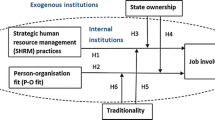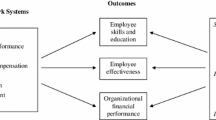Abstract
Japanese firms have undertaken two types of corporate reform, corporate governance (CG) reform and human resource management (HRM) reform, during the ‘two lost decades’ of the Japanese economy. These reforms tended to diversify Japanese firms, which have been stereotyped as being characterized by the coexistence of seniority-based pay and long-term employment practices, by introducing a new hybrid type of organization, based on the combination of long-term employment (LTE) and performance-related pay (PRP). However, it is not yet clear whether such an organization works effectively in the Japanese societal context. In particular, the adoption of a strong PRP scheme, promoted by market-oriented CG, may contradict the maintenance of LTE practices. Then, the firms that intend to strengthen the effects of PRP may be led to abandon the LTE policy, and become what is apparently a non-Japanese type organization. Alternatively, the hybrid organization can survive, if the effects of PRP are weakened, in other words, if the PRP scheme is designed for being compatible with LTE practices. From these contradictory perspectives, in this article we aim at examining how PRP operates within a hybrid organization by using two sets of data obtained by surveys done in 2005 and 2009 by a Japan Institute of Labour Policy and Training (JILPT) team. These questionnaire-based surveys included 2802 and 8353 respondents, respectively. These data sets provided useful and original data permitting us to analyze employees’ work motivation problems which could be specified as three types: achievement of individual performance, contribution to the overall company performance, and meeting the challenge of a new task. Evidence showed that these three types of motivation are affected differently by the PRP scheme and this led us to interpret the survey results from the viewpoint of a multi-task problem. Furthermore, we investigated to what extent further organizational diversity is viable among Japanese firms in connection with the issue of employees’ work motivation.
Similar content being viewed by others
References
Abe, M. (2000) “Internal Wage Differentials and Work Incentives (in Japanese),” Economic Studies (Hitotsubashi University) 51.2: 111–123.
Aoki, M. (2010) Corporations in Evolving Diversity: Cognition, Governance, and Institutions, Oxford University Press, Oxford.
Brammer, S., G. Jackson and D. Matten (2012) “Corporate Social Responsibility and Institutional Theory: New Perspectives on Private Governance,” Socio-economic Review 10.1: 3–28.
Foss, N. and K. Laursen (2005) “Performance Pay, Delegation and Multitasking under Uncertainty and Innovativeness: An Empirical Investigation,” Journal of Economic Behavior and Organization 58.2: 246–276.
Genda, U., R. Kanbayashi and T. Shinozaki (2001) “Performance Pay and Competence Development: Work Motivation as a Result (in Japanese),” Organization Studies 34.3: 18–31.
Hattori, Y. (2011) Psychological Contract in Japanese Companies (in Japanese), Hakuto-Shobo, Tokyo.
Holmstrom, B. and P. Milgrom (1991) “Multi-task Principal-Agent Analyses: Incentive Contracts, Asset Ownership, and Job Design,” Journal of Law Economics and Organization 7 (Special Issue): 24–52.
Jackson, G. and A. Apostolakou (2010) “Corporate Social Responsibility in Western Europe: An Institutional Mirror or Substitute?” Journal of Business Ethics 94.3: 371–394.
Jackson, G. and H. Miyajima (2007) “Introduction: The Diversity and Change of Corporate Governance in Japan,” in M. Aoki, G. Jackson and H. Miyajima (eds.) Corporate Governance in Japan, Oxford University Press, Oxford, pp. 1–47.
JILPT (2007) Japanese Company and Employment: Whither the Long-term Employment and Performance-related Pay (in Japanese), Japan Institute of Labor Policy and Training, Tokyo.
Joho, S. (2004) Decline of Performance Pay from the Inside View of Fijitsu (in Japanese), Kobunsha, Tokyo.
Koike, K. (1988) Understanding Industrial Relations in Modern Japan (translated by M. Sako), MacMillan, Basingstoke.
Marsden, D. (1999) A Theory of Employment Systems: Micro-foundations of Societal Diversity, Oxford University Press, Oxford.
Marsden, D. (2009) “The paradox of performance related pay system: Why do we keep adopting them in the face of evidence that they fail to motivate?” CEP Discussion Papers, No. 946. Centre for Economic Performance, London School of Economics and Political Science, London.
Miyajima, H. (2011) “How to Understand the Changes of Corporate Governance in Japan (in Japanese),” in H. Miyajima (ed.) Corporate Governance in Japan, Toyokeizai-Shinposha, Tokyo, pp. 1–70.
Miyamoto, M. (2011) “Whither the Japanese employment and corporate governance (in Japanese),” in H. Sakurai et al. (eds.) Japanese Economy toward the Untraded Age, Soseisha, Tokyo, pp. 57–126.
Morishima, M. (1999) “The Effects of Performance Pay on the Workplace (in Japanese),” Journal of Japan Labor Studies 472: 2–14.
Morishima, M. (2007) “Current State and Issues of the Appraisals and Human Resource Treatment (in Japanese),” In JILPT (ed.) Japanese Company and Employment: Whither the Long-term Employment and Performance-related Pay, Japan Institute of Labor Policy and Training, Tokyo, pp. 135–182.
Nakajima, T., J. Matsuzaki and O. Umezaki (2004) “The Effect of Performance Related Pay on the Wages and Appraisals (in Japanese),” Japanese Economic Studies 48: 18–33.
Olcott, G. (2009) Conflict and Change: Foreign Ownership and the Japanese Firm, Cambridge University Press, Cambridge.
Ota, S. and F. Otake (2003) “Growth of Firms and Work Incentives (in Japanese),” Financial Review (Bank of Japan) 67: 4–34.
Otake, F. and H. Karasawa (2003) “Performance Related Pay and Work Motivations (in Japanese),” Economic Studies (Hitotsubashi University), 54.3: 193–205.
Rousseau, D. (1995) Psychological Contract in Organization: Understanding Written and Unwritten Agreements, SAGE Publications, London.
Streeck, W. and K. Thelen (2005) “Introduction: Institutional Change in Advanced Political Economies,” in W. Streeck and K. Thelen (eds.) Beyond Continuity: Institutional Change in Advanced Political Economies, Oxford University Press, Oxford, pp. 1–39.
Takahashi, N. (2004) Falseness of Performance-related Pay (in Japanese), Nikkei BP, Tokyo.
Tsuru, T. (2001) “The Responses of Employees to Personnel Appraisals and Wage Differentials (in Japanese),” Economic Studies (Hitotsubashi University) 52.2: 143–156.
Tsuru, T., M. Abe and K. Kubo (2005) Human Resource Management Reform in Japanese firms (in Japanese), Toyokeizai-Shinposha, Tokyo.
Author information
Authors and Affiliations
Corresponding author
About this article
Cite this article
Miyamoto, M., Nohara, H. Can Hybrid Organizations—Based on the Combination of Long-term Employment and Performance-related Pay—Operate Effectively in Japan?. Evolut Inst Econ Rev 10, 217–243 (2013). https://doi.org/10.14441/eier.A2013012
Published:
Issue Date:
DOI: https://doi.org/10.14441/eier.A2013012




